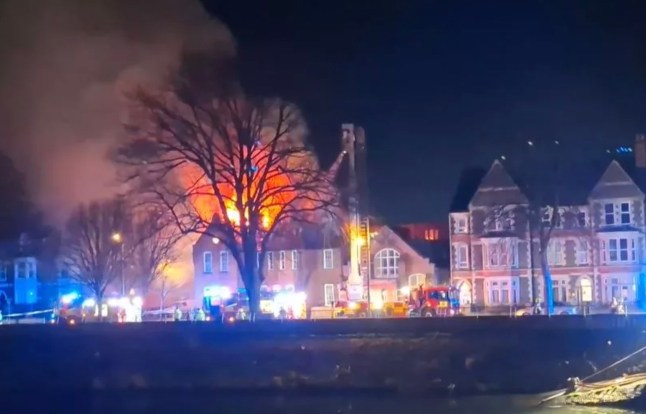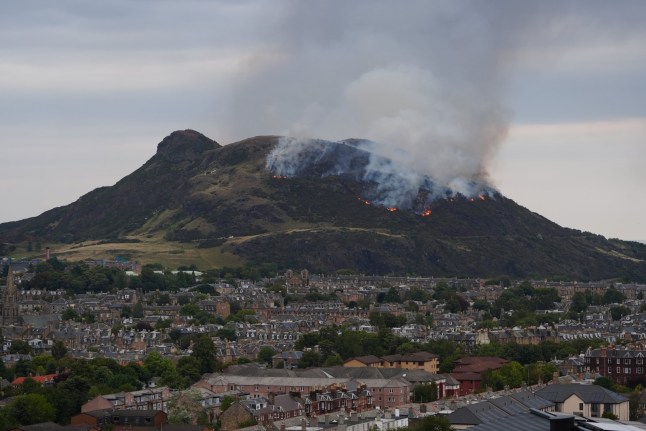To view this video please enable JavaScript, and consider upgrading to a web
browser that
supports HTML5
video
London’s Elizabeth Line and the Overground have been overwhelmed by people as the travel carnage continues amid the Tube strikes.
Pictures show hundreds of passengers pushing to enter Liverpool Street, while inside, multiple escalators are not operating.
One frustrated commuter, who did not wish to be named, told Metro that this is an ‘accident waiting to happen’.
They said: ‘It is very busy, chaos… One escalator was not working, which slowed things down massively.
‘At the top of the exit escalator, people are crowded making it very difficult to step off safely.’
Members of the Rail, Maritime and Transport (RMT) union including drivers, signallers and maintenance workers launched a series of strikes over pay and conditions, leaving the city’s entire London Underground network suspended until Friday.
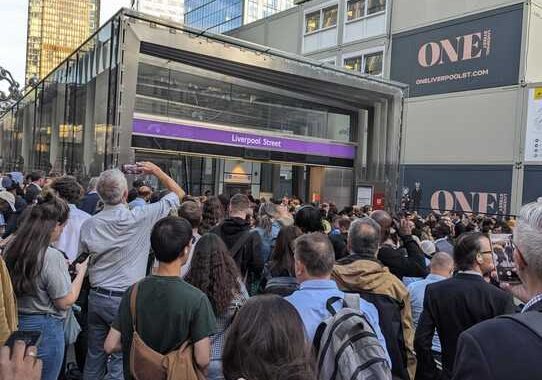
Commuters tried to head into work in alternative ways by using buses, taxis or Ubers, or by picking up a Boris bike, but this increased demand caused gridlock on the roads, with buses forced to turn passengers away after reaching capacity and cab fares soaring.
To add insult to injury, the Transport for London (TfL) website crashed this morning, making it much harder to search for alternative routes.
Several commuters were also left taken aback after their Uber drivers said they weren’t aware of the strikes.
One driver told a Metro news editor: ‘Is there a tube strike happening today? I had no idea. The roads are so much busier now than they usually are.’
Despite extensive coverage of the upcoming strikes, some commuters were none the wiser, with one claiming she was ‘stranded in Hammersmith for two hours’.
The five-day strike was called by the Rail, Maritime and Transport union who want higher wages, a four-day week and discounts on train journeys.
The Elizabeth Line and London Overground services are all still running, however they are significantly busier than normal, and a separate strike will also disrupt travel on the DLR.
Chaos for Metro reporters trying to get into the office
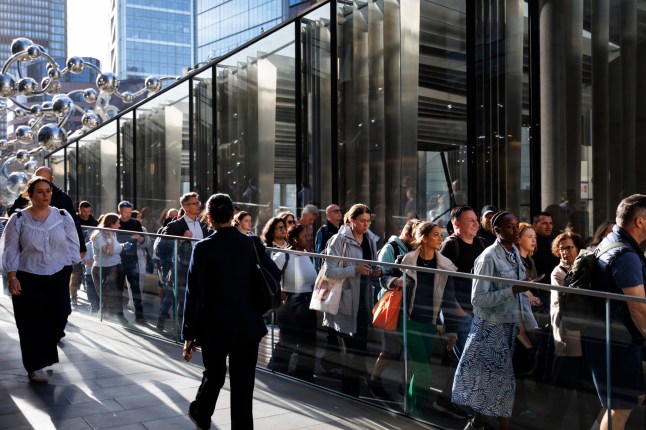
Senior social and platforms journalist Kate Rice spent more than three hours in an Uber from Walthamstow to west London this morning.
She said: ‘The car moved so little that I got multiple alerts asking if I was okay because the car had been stationary a suspicious amount of time.
‘I passed countless stations with confused people hovering outside them, but I don’t think my situation was much better.’
It took video producer Jed Bradley an hour and a half to travel from Clapham Junction to Chelsea via bus – in part thanks to temporary traffic lights at Battersea Bridge.
Lifestyle journalist Alice Giddings said her 30-40 minute commute took three hours this morning.
She added: ‘I’d been dreading the tube strikes all weekend and when this Monday morning came, I tackled the task of getting from zone 6 to zone 1.
‘After three Ubers cancelling on me and queuing for 30 minutes for a bus, I eventually managed to hop on a 139 to get me to The Savoy before having to wait another 20 minutes for a bus which was meant to be three minutes away.
‘I then had to make it around 17 stops which meant I was an hour-and-a-half late to work.’
Head of newsletters Sophie Laughton commented: ‘I got a Lime bike after Uber let me down, but Hyde Park was a death trap.
‘So many inexperienced cyclists doing dangerous things at 16mph and traffic was the worst I’ve ever seen it.’
Alex Goldsmith, our head of social video, said: ‘I was in a car for two hours and on the brink of a meltdown. Uber Reserve just isn’t a thing that works.’
And me? I pre-booked an Uber from St Pancras International to Kensington for £34 – but it was cancelled 20 minutes after it was supposed to pick me up.
Instead, I had to search for a new driver, and my ride got them to the office 45 minutes late at a cost of almost £70.
What lines are affected by the Tube strike?
Strikes are planned on the Tube and DLR from midnight on Sunday, September 7, until just before midnight on Thursday, September 11.
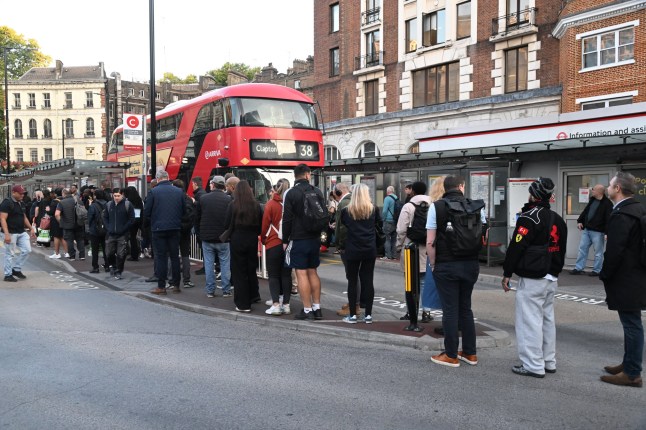
Little to no service is expected on the Tube across all Underground lines between Monday 8 and Thursday 11 inclusive:
- Bakerloo
- Central
- Circle
- District
- Hammersmith & City
- Jubilee
- Metropolitan
- Northern
- Piccadilly
- Victoria
- Waterloo & City
All Underground lines are currently ‘suspended’ today, as reported on the Tfl homepage.
Walkouts will mean there will also be no service on the DLR on both Tuesday and Thursday.
Is the Elizabeth line affected by the Tube strikes?
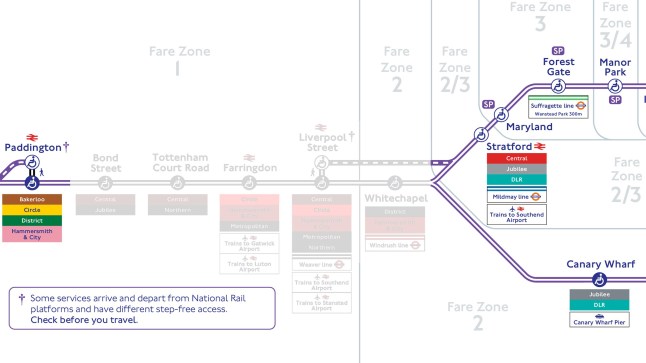
Services on the Elizabeth Line which share stations with the Undergroundmay also be disrupted, TfL has said, with trains not stopping between Whitechapel and Bond Street before 7.30am and after 10.30pm on strike days.
The commuter chaos is expected to continue until Friday, with no Tube services expected to be running before 8am.
While there are no strikes on the Elizabeth Line itself, its services have still faced delays this morning due to the knock-on effect of the strikes.
Bond Street, Tottenham Court Road, and Farringdon stations opened later than planned this morning, sparking concern among commuters, but the line is now running without issues.
New here? Sign up for our daily News Updates
Hi, I’m Noora Mykkanen, Metro’s senior news reporter. I cover TfL, the London Underground, railways, airports and all things transport.
If you want to stay up to date on news from around the world, our News Updates newsletter serves the top headlines straight to your inbox, every day.

Start your day informed with the latest in crime, weather, transport and more, as well as fascinating takes on the stories everyone’s talking about. Sign up now.
Will the Tube strike be called off?
Discussions remain ongoing to try to reach a settlement between unions and TfL.
Previous planned walkouts have often been called off at the eleventh hour following a breakthrough in talks.
An RMT spokesperson told Metro: ‘We remain open to talks and are awaiting a revised offer.’
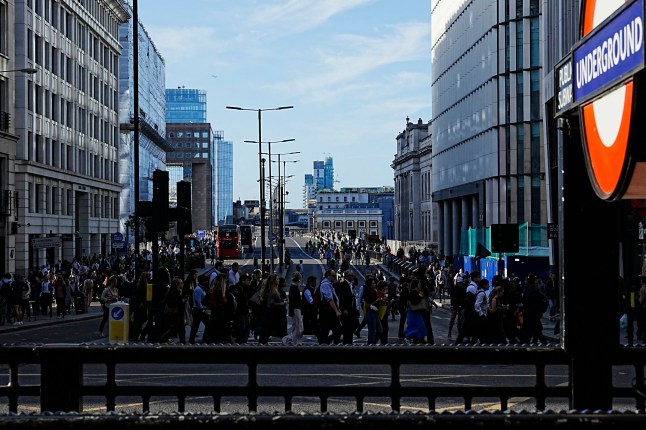
Michael Roberts, the CEO of London TravelWatch, said: ‘Strikes on public transport are a huge inconvenience for passengers. We urge all sides to work together and head off the threat of next week’s industrial action, but it looks like people should expect widespread disruption.
‘Passengers are advised to check online for the latest information about affected services and be prepared to make alternative arrangements.’
Downing Street called on the RMT union and Transport for London to get back to the negotiating table to end the Tube strike.
The Prime Minister’s official spokesman said: ‘I think Londoners will rightly be fed-up with the disruption from Tube strikes this morning – as parents try and drop their kids off at school, get to hospital appointments, get to work – and RMT and TfL need to get back around the table, work together to resolve this dispute in the interests of passengers.’
Will the Overground be affected by the Tube strike?
Overground services and the Elizabeth Line are not directly affected by the Tube strike.
However TfL has warned that some services may be disrupted, particularly at stations served by Tube lines.
Services are expected to be ‘extremely busy’ and may not run to their original destination at times or stop at all stations.
Why are Tube drivers striking?
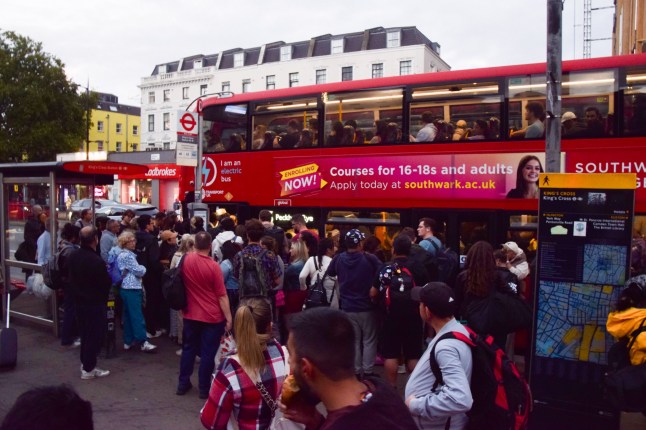
The RMT union says it has called the strike due to a breakdown in talks with management over pay and conditions, including ‘extreme shift patterns’.
Jared Wood, the union’s London transport regional organiser, told BBC London News that post-Covid staffing cuts had squeezed workers
‘Our members are proud of the service they provide.. but [they] are delivering that with 2,000 fewer staff on the London Underground and that’s led to a huge intensification of work, more extreme shifts’, he said.
Wood said the union was pushing for a shorter, 32-hour four day week.
He added: ‘We’re not expecting them to deliver that in one go. We just want to see some progress.’
Earlier today, Wood told London Centric that the only way to recover from the exhaustion is ‘with more quality time away from the workplace’.
He said about the fatigue: ‘People on London Underground will typically work a roster where they may do seven shifts where they start at 4.30am in the morning.
‘They’ll then move to middle shifts where you’re working from later in the morning to the afternoon.
‘Then you do really late shifts, where you’re starting late afternoon, finishing at 1 or 2am. And then many people work overnight as well.
‘We do that on a constant cycle where bank holidays and weekends are considered as normal working days. And it is exhausting.
‘I did it myself for many years, and you’re in a constant sort of brain fog state of fatigue. You never really recover.
‘The only way that you can recover is with more quality time away from the workplace. And that’s what we’re asking for.’
Get in touch with our news team by emailing us at webnews@metro.co.uk.
For more stories like this, check our news page.

